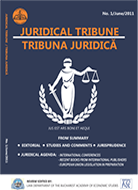Separation and balance of power and discretionary power in public administration
Separation and balance of power and discretionary power in public administration
Author(s): Oana ŞarametSubject(s): Law, Constitution, Jurisprudence
Published by: Societatea de Stiinte Juridice si Administrative
Keywords: separation and balance of powers; discretionary power; public administration; excess of power;
Summary/Abstract: Separation and balance of powers is one of the fundamental principles which is a fundamental element of the rule of law in any contemporary. The recognition of this principle does not imply that even public administration authorities must have a rigid behaviour, and that they are not allowed to have and exercise a discretionary power, a right of appreciation. However, the exercise of such power or right must be within the limits of that principle and, implicitly, of the principle of legality. Nowdays, we can observe that any public authority, as well as those in the sphere of public administration, tries to force the limits of its discretionary power, or such a behaviour could affect the correct and constitutional functioning of the rule of law. This article is intended to be only an initial approach to identifying the constitutional aspects relevant to the proposed theme by using methods such as comparative or systemic method. Thus, we want to identify those constitutional mechanisms that constitutional legislators have established to prevent overcoming the limits of this discretionary power. Later, through other articles, we will have the opportunity to identify the risk factors that arise in such situations, as well as possible solutions to reduce or even eliminate these factors.
Journal: Tribuna Juridică
- Issue Year: 8/2018
- Issue No: 16
- Page Range: 437-452
- Page Count: 16
- Language: English

